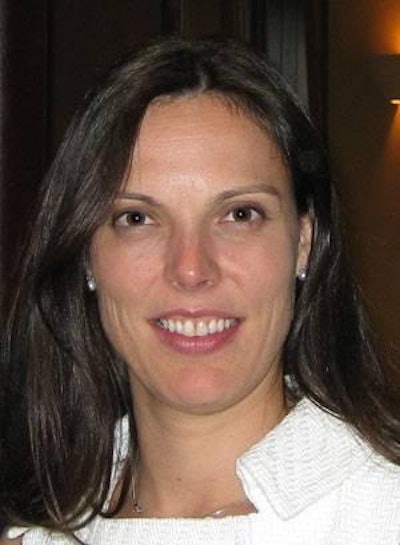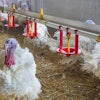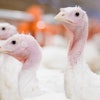
Feed Management: For readers in North America that might not be familiar with the International Feed Industry Federation, please give us a brief overview of what the organization does.
Alexandra de Athayde: The International Feed Industry Federation represents the global feed industry as an essential participant in the food chain that provides sustainable, safe and nutritious food. Our members comprise the whole feed chain and include national and regional feed associations, feed related organizations and corporate members from around the globe. Overall, our members represent over 80 percent of the global animal feed industry.
Given the anticipated growth of the world’s population to approximately 9 billion people by 2050, we know from United Nations' Food and Agriculture Organization estimates that the world will have to produce approximately 60-70 percent more food by then. We believe that animal protein production will grow even more. It is vital that, as an industry, we can meet this challenge in a sustainable and safe way, to ensure that we can continue to feed the world in the future. The International Feed Industry Federation and its members work towards this by shaping international feed standards, which in the end will impact both producers and users of feed at the local level, and by spreading good practices globally. For more information on our work please visit our website.
FM: You took the position of executive director of International Feed Industry Federation this past year. What objectives do you personally hold for the organization?
AD: My key objective is to represent the global feed industry as an essential participant in the food chain and to provide unified leadership to promote the global feed industry in order to contribute to the sustainable supply of safe and healthy feed and therefore, food.
In practice, this means that one of my priorities is to strengthen the relationships with our key institutional stakeholders at the global level, including the World Trade Organization, Food and Agriculture Organization, World Health Organization, World Organisation for Animal Health and Codex, as well as with feed associations and feed related organizations in the animal production chain around the globe.
Another priority is to ensure that the International Feed Industry Federation’s voice is heard through better public presentation and clearer messages. It is essential that the feed industry be seen as a transparent and safe part of a sustainable food chain.
FM: How does the International Feed Industry Federation assist its membership?
AD: The International Feed Industry Federation is the global platform for the whole feed chain to come together and discuss our key challenges and opportunities for the future. It is the only global organization that represents the feed industry’s interest vis-à-vis international regulators to ensure high standards of health and welfare for animals and people.
For example, in April 2013, the International Feed Industry Federation is organizing the 4th Global Feed & Food Congress, which will bring together our members, international regulators and stakeholders in the food and feed chain for the first time on the African continent. Hosted by the Animal Feed Manufacturers Association, our South African member, the Congress theme “Safe Feed & Food for All” links to the global challenge to feed 9 billion people by 2050, and to do so sustainably.
FM: What do you see as being the biggest issues facing the global feed industry in general and the North American feed industry in specific?
AD: The big global challenge for our industry is how to meet the increased demands for animal proteins by consumers, given an increase in world population to 9 billion by 2050, sustainably and affordably.
More specifically, there are a number of current trends which pose significant challenges for the feed industry in North America, and also globally:
- Feed manufacturers’ margin squeeze: pressure from livestock producers to keep feed costs low, but upward pressure from commodity suppliers on grain pricing.
- Manufacturing over-capacity: in short, too many feed mills are operating below optimum throughput levels, as livestock inventories have reduced. This will likely lead to further industry consolidation on the manufacturing side and will tend to change the structure of the industry over time.
- Increased government regulation without substantiating cost/benefit analysis: practical and effective regulation is not bad. However, regulation that does not provide the intended benefit is only costly to the industry and reduces global competitiveness.
FM: What are your thoughts on feed safety?
AD: There is no doubt that consumers expect high quality and safety along the entire feed and food production chain. Consumer confidence and trust is absolutely the foundation of anything our industry or the food industry does. This trust can only be maintained through high food safety standards along the entire chain, which the International Feed Industry Federation helps to develop and harmonize through our work with the Food and Agriculture Organization and other international bodies.
The International Feed Industry Federation also provides practical support to feed producers worldwide by supporting the spread of good manufacturing practices and higher feed safety standards. For example, the International Feed Industry Federation and the Food and Agriculture Organization “Feed Manual of Good Practices” is intended to increase safety and feed quality at the production level both for industrial production and on-farm mixing with a particular focus on the developing world.
FM: What are your thoughts on genetically modified organisms?
AD: We believe in science-based solutions and continued innovation to continue to make our industry more sustainable and efficient. There is no doubt that we can meet the demographic and sustainability challenges only through strong innovation and better technology. Clearly genetically modified organism cultivation is one important technology capable of providing sustainable solutions to increase yield while lowering presence of undesirable substances in feed (e.g. aflatoxins) in view of meeting the challenges of the future and producing more with less. However, the feed industry will continue to provide non-genetically modified feed solutions to meet particular niche market demands in certain world regions, including organic feed.
FM: The term “sustainability” is a widely used and often misunderstood term. What is the International Feed Industry Federation's position on sustainability?
AD: Sustainability is the reality of the future of our industry, as we need to ensure we can contribute to increase food production by 60-70 percent by 2050 in a safe, environmentally responsible and affordable manner.
While there are significant successes in the industry’s efforts to reduce our environmental impact while increasing production per acre and animal, we need to continue to discover additional technology and practices to keep this trend moving forward. So, in the eyes of consumers, producers and the broader food industry, we need to continue to find answers to meet the demand and preserve the quality of our resources.
FM: Is there anything else you’d like to share or tell our audience?
AD: At the end of the day, we want to ensure that we can feed the world in the future and that our industry continues to strive for sustainability, safety and efficiency. These are all goals our chairman and our members strongly support.
Finally, I will continue to work with our members to ensure the International Feed Industry Federation’s voice is heard. It is essential that the feed industry be seen as a transparent and safe part of a sustainable food chain. Indeed, one of my objectives is to communicate better in the next months and years what the feed industry is doing to guarantee safety as part of a sustainable food production chain.


















